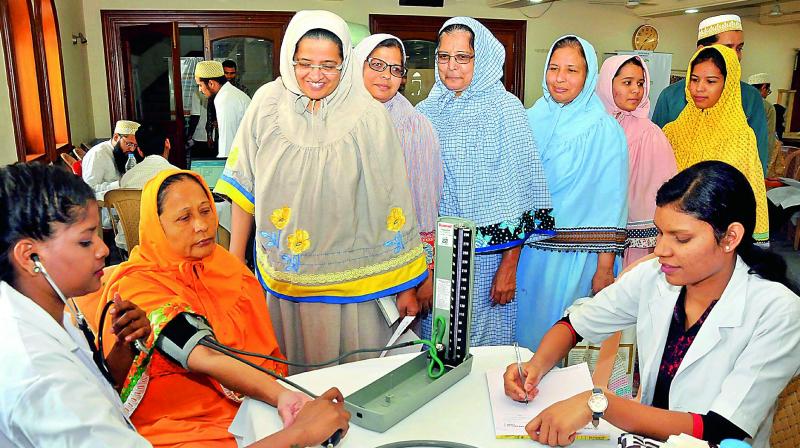Hyderabad: Masjids as community centres a healthy trend
Mosques in city are doubling up as medical clinics.

Hyderabad: The idea of using mosques for purposes other than congregational prayer is gaining traction in Hyderabad. With the Masjid-e-Ishaq in the Old City breaking new ground by doubling up as a medical clinic, more and more mosques are now coming forward to emulate the example.
To take the concept further, Safa Baitul Maal, an educational welfare and charitable trust, has convened a meeting with members of various Masjid committees, Mutawwalis and responsible persons in the city on Saturday to discuss how best the masjid premises could be utilised for welfare activities.
A mosque should be much more than a place of worship. One shouldn’t just pray and go home but find answers to community needs. Presently, most of the mosques remain open for the duration of namaz five times a day and then close. This is the case with masjids not just in the city but elsewhere too. Of late, some like the Azizia Masjid at Humayunnagar and the Masjid-e-Ishaq in Achireddy Nagar have started using their premises for rendering medical aid to the poor and needy, irrespective of their religion.
Many Muslims feel it is time the concept is replicated on a large scale for the greater benefit of the community.
“This is actually an Islamic concept. The Masjid-e-Nabawi (the Prophet’s mosque in Madinah) used to be the centre of community activity and not just a place of worship. We want to revive this concept and ensure that mosques function as centres of welfare activity,” says Gayas Ahmed Rashadi, who heads the SBM. This organisation is working in 26 slums in the city providing food and financial assistance to below-poverty-line families.
Maulana Abu Talib Rahmani, member of All India Muslim Personal Law Board, who will be the key speaker at the programme, is a strong advocate of making the local mosque the ‘mohalle ki parliament’ (parliament of the local community). He wants the mosques to be the hub of welfare activities rather than merely serving as a place of worship. Those in charge of mosques should be well aware of the people living in the basti and build a rapport with them.
The sick, destitute, and needy should be taken care of. Those in dire need of money should be assisted and relieved from the clutches of money lenders, says Mr Rashadi.
The Azizia Masjid, which has a Facebook presence, is the first in the city to take the initiative of throwing open its doors to address community needs. English speaking youth, who flock to the mosque in good numbers, have been availing the career counselling offered here for quite some time. Recently, the Masjid-e-Ishaq in the old city caught everyone’s attention when it opened a primary health clinic in the mosque in association with the Helping Hand Foundation (HHF).
Encouraged by the good response, the HHF has started using the masjid loudspeaker for disseminating community health information. Short announcements are made from time to time about the availability of specialist doctors and their timings.
“Sometimes we need to announce the unavailability of a doctor on a particular day so that patients are not inconvenienced and the masjid sound system comes handy,” says Mujtaba Hasan Askari of HHF.
It is not just azaan (the prayer call) but health information too that people here look forward to from the local mosque.

